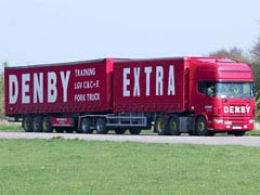Posted 6th June 2008 | 1 Comment
EWS welcomes government ban on ‘super lorries’

An example of a ‘super-lorry’
BRITAIN’S largest rail freight operator, EWS, has welcomed Transport Secretary Ruth Kelly’s decision not to permit the introduction of longer and heavier lorries onto the road network in Britain.
But the Chartered Institute of Logistics and Transport has criticised the announcement. Its Chief Executive Steve Agg said: "Rejecting LHVs [longer heavier vehicles] without physical trials is a wasted opportunity. The fact that the Secretary of State has used the emotive term ‘super-lorry’ suggests a biased approach.”
Ruth Kelly’s decision was based on a Transport Research Laboratory report that looked into the economic, environmental and operational aspects of operating larger lorries. It concluded that longer and heavier lorries would increase CO2 emissions due to freight shifted from rail to road, creating serious implications for the management of the road network.
The research also recognised that these longer vehicles would be unsuitable for many roads and junctions, as they would introduce additional safety risks to the road network.
EWS said that the decision underlined the view that rail freight is seen by government as an essential transport mode to help reduce CO2 emissions.
Freight trains emit five times less C02 per tonne kilometre than road haulage, said
Graham Smith, EWS Planning Director, who added: “EWS strongly supports the decision by the Government to reject the operation of longer and heavier lorries on the road network.
“The decision firmly places rail freight as the key low-carbon and high volume transportation mode of choice for British industry. EWS is doing its part and working with British industry to increase the use of rail freight transport.”
But EWS conceded the research for the Department for Transport states that there might be a case for “a modest increase in the length of current articulated vehicles.” EWS said it is seeking further clarification on how this possible case could impact on the volume of freight moved by rail and the level of CO2 emissions released by transport.
Meanwhile, the Chartered Institute of Logistics and Transport said that while recognising the environmental benefits of rail freight, CILT believed that LHVs could have a place in the transport hierarchy.
Steve Agg added: “The sensible decision would have been to specify trials which could have provided real data and tangible experience in order to reach an objective conclusion.
"We believe it would be straightforward to identify a simple core network for trials, based around the motorway network. Even if LHVs were approved it is likely that their usage would be limited and, in certain circumstances, they could actually make sense. Therefore, to say we are disappointed with this announcement is an understatement."
Reader Comments:
Views expressed in submitted comments are that of the author, and not necessarily shared by Railnews.

Lli, S Wales
I totaly disagree with the bigger trucks and think it would be a silly idea to intrduce them. For a start our roads would never cope with them, There would be more accidents, increses road freight, as it would definitly increase the tonnage carries by road, and also more fuel will be burned and more CO2 created.
I am all for RailFreight